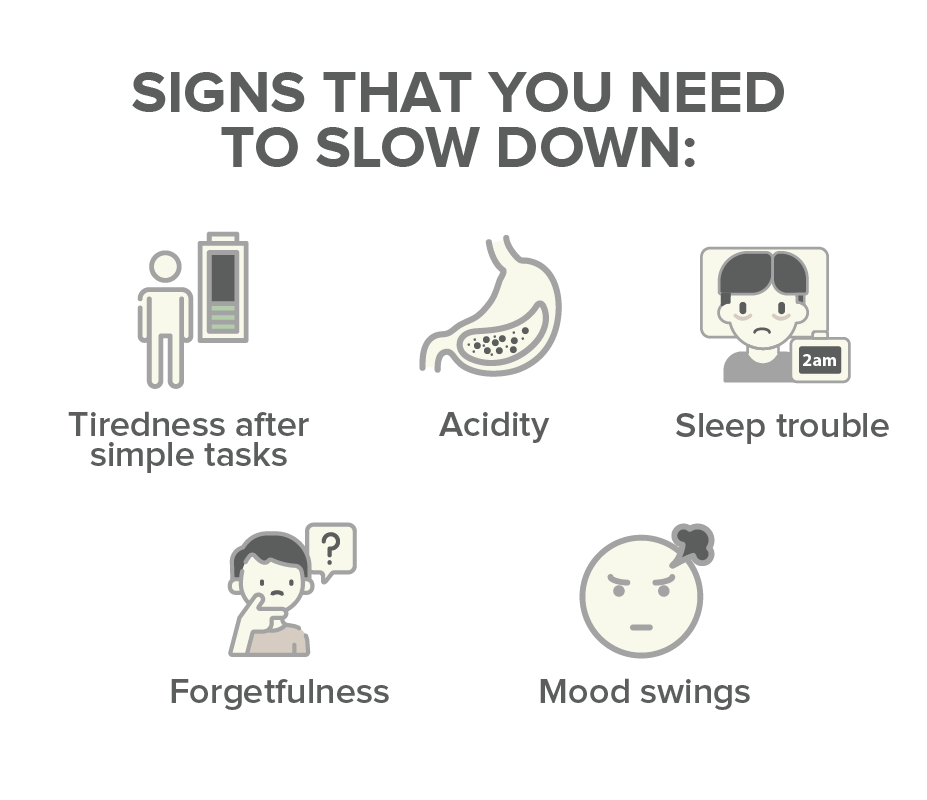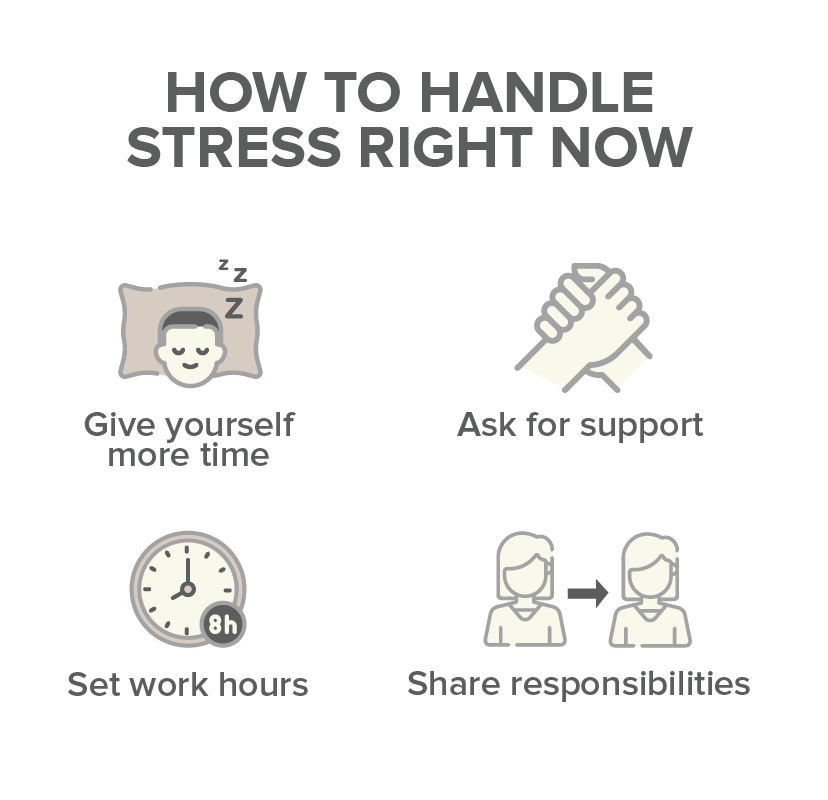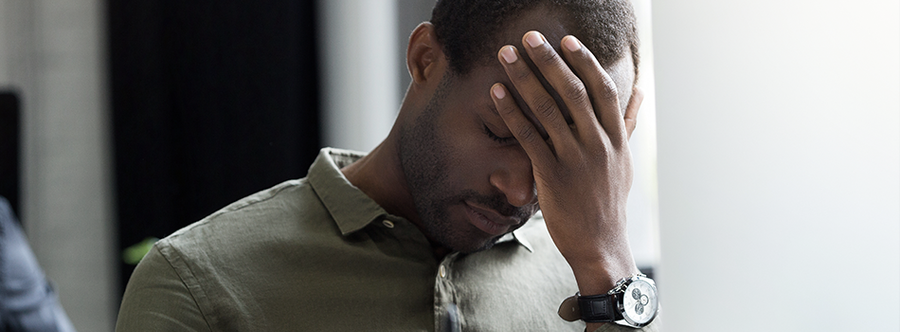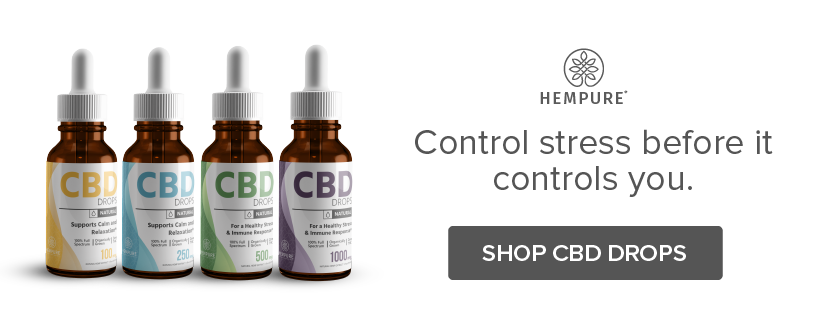How to identify and deal with excessive stress.
Sabina King on Apr 11th 2020
April is Stress Awareness Month – perfect timing, because we’re all suddenly very aware of stress! It’s normal to feel such a gamut of emotions – worry for the world, stress about the economy, overwhelmed by spending too much time with family, or anxious about being separated from family. The one thing uniting us all is that we’re in this together. That being said, the situation will disproportionately affect some people, and those who are prone to stress may have a hard time dealing with this sort of uncertainty. It’s important to nip stress in the bud, because what a lot of people don’t know is that chronic stress can often take its toll in the form of ‘burnout’.
In order to stop stress, you need to be able to spot it, in yourself and in others. We’re going to discuss the many ways that stress manifests, and how some mental first-aid can help.
What is burnout?
Burnout is a state of chronic stress that is characterized by:
- Physical and mental exhaustion
- Cynicism and detachment
- Feelings of lack of accomplishment
While burnout has mostly been associated with work-related stress, research shows that one’s overall lifestyle and one’s personality can be significant contributor to it. In the current times, we’re definitely dealing with more responsibilities than usual - which is why we may be particularly vulnerable to it.
For instance, there are some industries where employees may be exposed to high levels of stress, such as healthcare workers. Obviously, burnout may be a greater risk in these populations. However, people caring for children or aging parents can also burn out. In the current scenario, with kids at home and elderly parents needing assistance, it’s safe to say that a majority of us are susceptible to high stress, and therefore burnout too. Perfectionism, a need for control and low self-esteem are also risk factors.
How and why does burnout happen?
Burnout doesn’t occur all of a sudden. It’s the end result of a process that creeps up on you slowly.
Research suggests that burnout is closely linked with stress hormones, primarily cortisol. Cortisol is a hormone that is vital for memory processing and metabolism, but is most commonly associated with stress responses. When you’re in immediate danger, the body triggers its ‘fight-or-flight’ response, which stimulates production of adrenaline and cortisol. When this happens, the body also shifts focus to muscles and circulation (in case you need to fight or run) and shifts focus away from non-vital processes such as digestion and reproduction.
The fight-or-flight response is normal and necessary when you’re dealing with sudden physical danger. But our bodies don’t always know the difference between physical and mental danger. If you’re overly worried about daily life, that can trigger the same response in your body, leading to a sustained overproduction of cortisol.
What are the warning signs of too much stress?

Small daily stressors may not register as ‘prolonged stress’ to many people dealing with it. But if you listen to your body and mind, it will give you signs that you need to slow down. Most of these are warning signs that your cortisol production is in overdrive.
Physical signs that you’re too stressed out:
- Feeling tired more than usual
- When assessing whether you’re experiencing stress-induced fatigue, it helps to compare it to your usual energy levels. Are you taking longer to complete simple tasks? Are you waking up tired regardless of how much sleep you get?
- Insomnia
- Gastrointestinal issues such as acidity, nausea or diarrhea
- Weight gain around the midsection
- Bruising easily
- Wounds that don’t heal as fast
- Prolonged cold/flu
The manifestation of stress on the mind:
- Increased forgetfulness.
- Mood swings
- This includes getting angry with family or colleagues quicker than usual, or being extremely sensitive.
- Reduced oxytocin production
- This results in more detachment and cynicism. For instance, not wanting to speak to friends, or reduced interest in things you usually like.
- Apathy
- You may start to feel like nothing you do matters, and can’t think of any meaningful goals to hold onto. Losing one’s job because of a global health crisis puts a lot of Americans at risk for this.
What are the 12 phases of chronic stress?
According to the psychologists that coined the term itself, burnout occurs in 12 phases. Although this has mostly been used in the context of workplace burnout, we’ve tried to portray what these phases might look like in current times.
Excessive drive/ambition
When starting out with staying at home, parents may be overzealous with the “we can do it all” attitude, putting more pressure on themselves to work and take care of the kids. Those wanting the experience of staying home to be too productive or creative may also be putting undue pressure on themselves.
Pushing oneself to work harder
Once goals have been set, one may struggle to meet them. An initial surge of energy may even allow the body and mind to meet somewhat unrealistic goals.
Neglecting self-care
In the process of making a good dinner, teaching the kids and working from home, one may start to sleep later and wake up earlier, or skip meals themselves.
Displacement of conflict
It’s not always easy to know when one is pressuring themselves too much. One may start to blame stress on members of the family, resulting in petty squabbles. They may also blame their job or boss for the troubles.
No time for non-productive tasks
One may start to spend less and less time on relaxing activities such as calling friends or even watching TV. When they do, they seem to derive less pleasure from it.
Denial
In the same vein as displacement of conflict, one might blame their stress on other people not doing things correctly. Others may start to appear lazy, incompetent or annoying.
Withdrawal
Spending more time alone, wanting to complete tasks by themselves. Those isolating by themselves may reach the withdrawal stage much sooner.
Behavioral changes
Excessive anger, emotional outbursts for no clear reason.
Depersonalization
Feeling detached from one’s life, feeling like one has no control. Uncertainty about the future of this crisis can contribute to these feelings as well.
Inner emptiness
Feeling empty may result in behaviors such as overeating, smoking or drinking.
Depression
Life seems to lose meaning.
Mental or physical collapse
What is commonly referred to as a ‘nervous breakdown’. When individuals reach this point, they usually need some kind of mental health assistance.
How to handle stress better during this outbreak.

If you have seen signs of excessive stress in yourself or a loved one, here are some strategies to help before it gets overwhelming.
Allow yourself more time to complete tasks.
Often when setting deadlines, we don’t account for things like interruptions, distractions or even tiredness. One of the first things one must do is allow yourself more time to complete tasks, even simple ones. If the dishes pile up a little bit or the toys lie around for a little longer, it’s perfectly okay.
When it comes to working from home, speak to your employer about relaxing deadlines as well – a lot of people might assume that working from home is easier, but it can in fact be harder, with more distractions and more availability.
Communicate and ask for support.
If you’re handling too many chores, speak to other members of the family about pitching in with work. Speak to your boss frankly about your mental state as well – in a time as uncertain as this, most reasonable employers would understand the pressures their employees are under. If you’re living alone and can’t get anyone to help, you can still call on friends or family for emotional support over the phone.
Prioritize.
It can be overwhelming to have too many ‘quarantine goals’, and seeing the amount of productive activities online doesn’t help. It’s important to remind yourself that there are only a limited number of hours in the day, and if you don’t have the energy to do something wildly creative or productive with your free time, that’s alright. Figure out what’s most important and allocate time accordingly. For instance, doing the dishes is more important right now than sorting your wardrobe. Fixing a meal is more important than picking up a new hobby.
Let people do things their way.
For those who like things done a certain way, it can be difficult to watch other members of the family do things differently. This may even make you want to take over more tasks so that they get done ‘the right way’, which is a slippery slope that leads to even more pressure and stress. Be mindful and notice which processes are plain wrong and which ones are just different. Also, it’s okay to let some things be imperfect.
Set work hours.
If you’re working from home, make sure you aren’t supposed to be available around-the-clock. Constant accountability can create unnecessary stress. Don’t wake up and check your email – give yourself some time to begin the day peacefully. Similarly, set a time for you to ‘clock out’, and don’t be available after that.
Schedule.
It may sound counterproductive to use scheduling as a way to reduce stress, but when done right, it can work wonders. Not only can it help you cut out distractions, but executing a schedule can also let you know which deadlines are unrealistic, and which activities require less time. Moreover, they help with indecision and constant wondering ‘what do I need to do next?’ When you first set up a schedule, it’s important to be flexible and easy on yourself. Most of us don’t really know where our time goes, which is why it’s likely that we’ll get it wrong on the first try.
Practice mindfulness.
This is as good a time as any to get into the practice of mindfulness. With practice, you can expect to be more aware of your stress triggers, be less reactive, be more in touch with what your body needs, and be more compassionate towards others. You can use a mindfulness app to get started.
Exercise.
There’s a reason exercise makes it to pretty much every ‘feel good’ list – because it really works. Lives right now are extremely sedentary, so it’s important to fit in even 10-15 minutes of physical activity through the day. Some jumping jacks or spot jogs would do the trick.
Taking care of a friend/family member on the road to burnout:
While all the tips above are great, people may not always react well to advice when they’re very stressed. Here’s how to take care of a friend/relative that you fear might burn out:
Let them know you’re there for them.
Not everyone reacts kindly to this, so if they get defensive, don’t take it personally. People might also just need someone to hear them out without offering advice. As helpful as your tips may be, don’t offer them unless you’re asked.
Don’t judge.
You may think someone’s pressures are self-inflicted and therefore easy to let go of, but that isn’t helpful to say. Try to see things from their point of view. Maybe their concerns are coming from a place of perfectionism, a need for control in these chaotic times, or because they’re deeply worried about their family.
Ask how you can help.
A lot of people believe that asking for help makes them weak, which is why sometimes it’s important to just ask them if you can contribute.
It’s okay to feel a wide range of emotions given the current pandemic. While we navigate the uncertainty in the world outside, we mustn’t underestimate the trials people face when locked home for too long. It takes practice to find a balance between taking enough care of yourself while also caring for others – but with time and focus, you’ll get there.
















